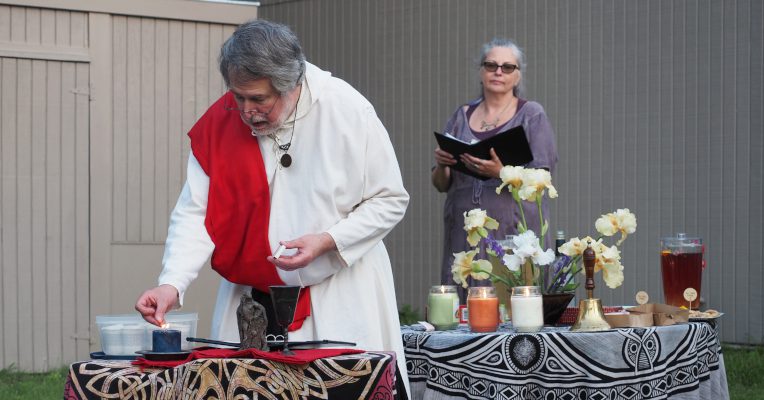I saw a good question and conversation on a friend’s Facebook page last weekend. It’s locked to friends-only so I can’t link to it, but I can present the question and then give my thoughts on the matter. Because I have a few.
Ursa Sylvest asked this question:
I’ve been seeing some posts in different groups that are debating the appropriateness of claiming a spiritual title for oneself. I wonder what my local community’s opinion is on title-claiming? I do have a few opinions myself, especially when it comes to culturally specific titles that are not applicable to most people raised in the United States, such as ’shaman’.
Do you have a title that you refer to yourself by? Was it given to you by your community, or did you claim it?
I’m leery of titles. Some people are obsessed with getting them, either by external investiture or by claiming them for themselves. Some people are more concerned with putting another line on their nametag than with actually performing the functions associated with the title.
I’m more concerned with what I do than with what you call me. I claim only two titles: Druid and priest. The other words I use to describe myself are part of my religious and spiritual identity – they’re descriptors rather than titles.
Still, titles can be meaningful and helpful, if they’re used properly.
Your identity – and not a title – is who you are
So much of the desire for titles is really a desire for an identity – to understand who and what you are.
“Who am I?” is one of those eternal philosophical and metaphysical questions that each of us must wrestle with. If we don’t wrestle with it, we’re likely to accept the identity impressed on us by the mainstream society – and that’s rarely a good thing.
In 2018 I wrote about Paganism as an Orientation. If you look at where and how and when I grew up, you’d think I’d be some kind of Christian. Or if I rejected that, an atheist. But I’m a Pagan, and being Pagan is part of who I am. So is being a polytheist, an animist, a magician, and all the other elements of my religious and spiritual practice.
But these are descriptors, not titles. Their value comes from embodying them in your life, not from having them as a label.
Focus on doing the work
As you begin to explore the depths of your religious and spiritual identities, you will begin to encounter titles: priest, diviner, sorcerer, hedge witch, high priestess, shaman, and many, many more. These aren’t identities – they’re roles. They’re job descriptions. And the need – for our communities and for ourselves as individuals – is for the work to be done.
Different traditions have slightly different job descriptions for “priest” but in general, a priest 1) serves their God or Gods, 2) mediates for their God or Gods, and 3) serves their co-religionists. Do you want to be a priest? Then focus on doing these things.
Byron Ballard says if you want to know who the high priestess is, look for who’s sweeping the floor and locking up the building at the end of the night. The older I get the harder this is, but I’m almost always part of the group that’s the last to leave after a ritual. It’s part of my obligation, whether I have a title or not.
There’s more to it than that. Priesthood is a formal relationship that involves callings, oaths, and commitments. But if you want to call yourself a priest – or any other religious title – focus on doing what priests do.
Titles have to be earned
Honesty is one of the most important virtues. Don’t pretend to be something you aren’t.
Are you doing the work? Does what you do match the job description? Are your skills adequate in all areas of responsibility?
Some titles can only be earned in a specific way, and can only be bestowed by certain organizations and authorities. I could gather all the necessary elements and recite the Latin Mass every morning and I still wouldn’t be a Catholic priest.
This is especially true when you’re talking about titles that are closely associated with specific traditions and cultures. The word “shaman” has moved beyond its origins with the Tunguskan people of Siberia. It now generally means “spirit worker in an indigenous tradition” – even though most indigenous traditions have their own words for their spirit workers.
But if you aren’t doing spirit work in an indigenous context then you aren’t a shaman – you haven’t earned that title.
If you’re doing it then you are it
There’s something to be said for “fake it till you make it.” I refused to call myself a priest for my first few years of practice – I didn’t feel like I had earned the title. But I functioned as a priest on a regular basis – I didn’t let the lack of a title keep me from doing the work that needed to be done. Then when I was spiritually ready to take vows of priesthood to Cernunnos, I already had the technical skills to do the job.
Our mainstream culture puts too much emphasis on certification. Among other things, we use college degrees as cultural screening tools when they have little relevance to a job description. That’s another rant for another time. What’s relevant here is that too many Pagans and other non-traditionally spiritual people feel like they have to have a title before they can do the work.
This is backwards. Do the work. The title will come in its own time.
And when it does – whether from yourself, from an outside authority, or from a group – then you can feel confident about claiming it.

Understand the title you’re claiming
What does it mean to be a priest or a shaman or a Druid or a person who has any other religious title?
What’s the job description?
What do people who carry these titles do?
In what context do they do it?
Too many people claim a title without understanding what’s involved. They just want to be that, so the call themselves that, with little thought to whether it fits them or not. Do some research and study – and some self-reflection – first.
The worst I’ve seen of this is when someone picks a word from a language that sounds exotic to them – sometimes Latin, sometimes Irish (which is a living language) – and says “this is what I am.” Even if they pick a relevant word, it has no real connection to what they do or to the people who speak that language. It just sounds cool.
If you feel the need to make up a title to describe what you do, you probably need to do a lot more research into your tradition, and a lot more reading in comparative religions. And then pick a word in your own language.
Self-given titles carry no authority
In the wider world, titles often come with authority. The Chosen Chief of OBOD has near-absolute authority on matters concerning the Order’s structure and curriculum. The Archdruid of ADF has much more limited authority, but still has considerable power within what is a democratic organization. Both leaders’ authority comes from their Orders and only exists within those Orders.
Self-given titles carry no authority beyond the person who claims them. You would think that would be obvious, but I’ve encountered plenty of people who acted as though because they call themselves a priest or a priestess then everyone else should defer to them. It doesn’t work that way.
So, are self-given titles valid?
For me, it comes down to one simple thing: do the deeds match the words?
Do you do the things that other people who carry that title do, and do you do them with a suitable degree of competence and commitment? Do you do them in a comparable context?
If the answer is yes, then the title is valid.
If the answer is no, then it’s probably not.
If a self-given title gives someone the confidence they need to take on new or additional responsibilities, that’s a good thing. If it acknowledges that someone is already doing the work, it’s a good thing.
If it gives someone an excuse for narcissistic and controlling behavior, then it’s a bad thing.
Focus on the work. The titles will take care of themselves.



















